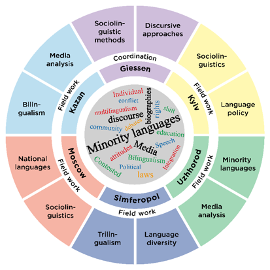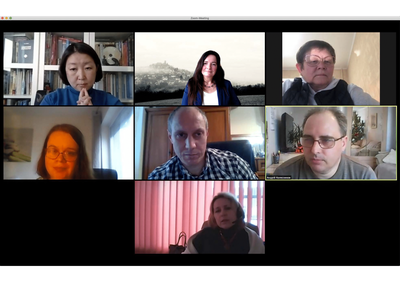Contested language diversity - Dealing with Minority Languages in post-Soviet Ukraine and Russia
Supported by the Volkswagen Foundation (04/2020 – 03/2023) in the Initiative: Trilateral Partnerships – cooperation projects between scientists from Ukraine, Russia, and Germany


The language diversity in Russia and Ukraine encompasses languages of a very broad functional spectrum: from endangered as well as lesser used languages to well-functioning minority languages such as Tatar in Russia or, more clearly, Russian in Ukraine. While societal and academic debates mainly focus on the last two, our project deals with a broad spectrum of languages that are threatened by functional restriction, assimilation or identity loss.
Detailed research of the contested language diversity and its impact on the multilingual societies is a very important factor of ethno-linguistic conflict prevention. How is language diversity discursively constructed, and what are the topics and argumentative patterns in the polarized debates on language diversity in Russia and Ukraine? Who are the actors in language diversity contestations, and in which manner do they overlap with the language as well as discursive societies? How do minorities position themselves with regard to the language ideologies? When and under which conditions does it come to disruptions in language biographies? What is the impact of the language diversity contestations on the language policy, and what are the societal consequences? By answering these research questions the trilateral project aims to provide a multifactorial analysis of the polarized language question including differing views of a broad spectrum of actors.
Contact:
Justus-Liebig-Universität Gießen
Institut für Slavistik
Otto-Behaghel-Str. 10D, in 35394 Gießen

Die Kooperationen mit den Partnerinstitutionen in Russland ist seit dem 24. Februar 2022 eingestellt.

|
Justus Liebig University of Giessen Institute of Slavic Studies, Giessen
|
|---|---|

|
Kazan Federal University Institute of philology and intercultural communication, Kazan Web-page |

|
National Academy of Sciences of Ukraine Institute of Ukrainian Language, Kyiv Web-page |

|
Russian Academy of Science Institute of Linguistics, Moscow Web-page |

|
Uzhhorod National University Faculty of Philology, Uzhhorod Web-page |

|
Crimean Republican Institute of Post-Graduate Pedagogical Education, Simferopol Web-page |

Screenshot from the digital project meeting, January 15, 2021
In process
The project virtual room is created on the JLU web-site (JLU box) for the interchange between the project participants, for sharing methodological data, and project results (interview transcripts and so on). The virtual room is open only for the project participants' use, and it is closed for public.








